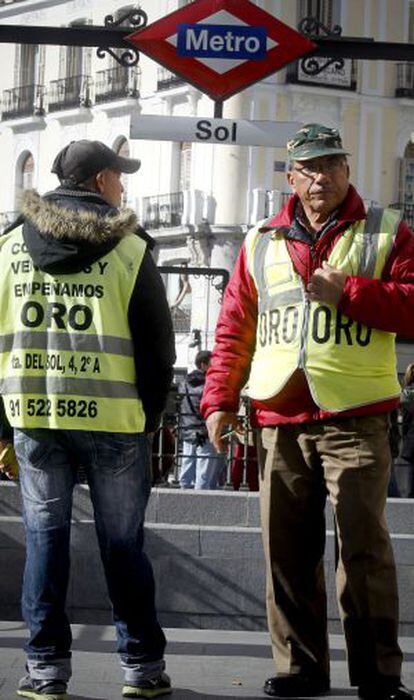Selling off grandma’s jewelry at a loss
Hard-up Spaniards are increasingly turning to cash-for-gold stores for quick money

"It's to help out our children. We personally don't need it because we're retired and we have our pension to live on, but it really helps them if we pull a little gold chain out of the drawer now and then," says Juana (an assumed name).
At first Juana is reluctant to talk about it, but eventually she admits she came to this cash-for-gold store in downtown Madrid to inquire how much she might get for her "little jewels." In fact, she has already sacrificed several items, it turns out.
One gram at a time, one ring at a time, Spaniards are emptying out their jewelry boxes in exchange for quick money. Cash-for-gold businesses have been mushrooming in Spanish cities since 2009, collecting hundreds of kilograms of the precious metal every month -- up to a metric ton on a good month -- according to industry sources. This, at a time when gold is commanding increasingly high prices on the international market.
Juana is from the Canary Islands, one of the Spanish regions with the highest unemployment rate (32.96 percent) and the highest volume of gold collected by these specialized stores: between 100 and 200 kilos a month for the last year, according to the same sources.
The gold that gets exported from Spain is later refined in places such as Switzerland, Britain and Germany, and ultimately becomes gold bars, the reserve asset of choice for many investors in times of crisis.
Marion Mueller, a precious-metal market analyst and vice-president of the Spanish Association of Precious Metals, says the market for gold is showing no sign of waning. "Gold continues to sell because the demand is there," she says. "The financially weak are forced to divest themselves of their jewels to gain liquidity. Meanwhile, others -- emerging countries, individuals -- would rather invest in this material because it's a safe bet. Both needs feed into one another."
In January 2003, one gram of gold sold for 10 euros. Now it goes for 45
In January 2003, one gram of gold was selling for 10 euros. A decade later, it goes for around 45 euros. But in a free market driven by the needs of desperate people, jewel owners are not always offered the fairest deals. A study conducted in 12 cities by the consumer organization OCU shows that cash-for-gold stores offer between 12 and 47 euros for a gram of gold, and recommends shopping around before selling an item too cheaply. Often enough, stores offer prices far below market rates.
Dora (an assumed name) has just received 310 euros for a bracelet that her sister once gave her. She was fired from the company where she worked as a cleaner a year ago.
"When they found out I was pregnant, they fired me," she says, pushing a stroller with a two-and-a-half-month-old infant inside. "Now I have to sell my gold to feed my baby."
Dora's unemployment checks are not enough to cover monthly expenses, but she has been careful about selecting the right business in which to sell her bracelet.
"You get a raw deal back in my village... they hardly offer you anything! Here, at least, they offer reasonable prices," she adds.
The legal requirements for such businesses do not include a minimum purchase price. EL PAÍS visited several establishments in different parts of Madrid, and was offered a little over 20 euros a gram, around half the market price for gold.
The most common type of fraud at cash-for-gold stores is lying to customers about the weight of the piece and offering a price significantly below its market value. These practices are difficult to detect if the customer does not file a complaint, and the victims tend to be "the most muddled people, those who don't know what they have," say sources in the Civil Guard.
You get a raw deal back in my village. Here they offer reasonable prices"
The law enforcement agency uncovered a scheme of this nature in Almería in February 2012. Around 1,000 people may have been the victims of this particular fraud.
But consumers now seem to be aware of which businesses are to be trusted and which are not. On one particular street filled with men wearing sandwich boards with "We buy gold!" ads, some stores are full of people while others lie empty for hours.
"If the customer asks me to, I show them how much the merchandise weighs," says the clerk at a tiny store, speaking from behind a glass window. A small kitchen scale, a plastic container where she places the jewels to weigh them, a few liquids to analyze the purity of the gold and a safe box inside a closet at the back are the only things inside the premises.
"The deception generally does not occur during the purity check," explains Jesús Yanes, president of the Spanish Gem Institute. "It's enough to scratch the item a bit and see how the color changes. The liquids are reliable."
But Laura Dos Santos, 58, knows that cases of fraud exist. That is why this Portuguese woman who lives in Madrid has been pawning her gold, rather than selling it, for three decades.
"It pulls me out of a pinch, but I always come back for it after a few weeks, or sometimes months."










































